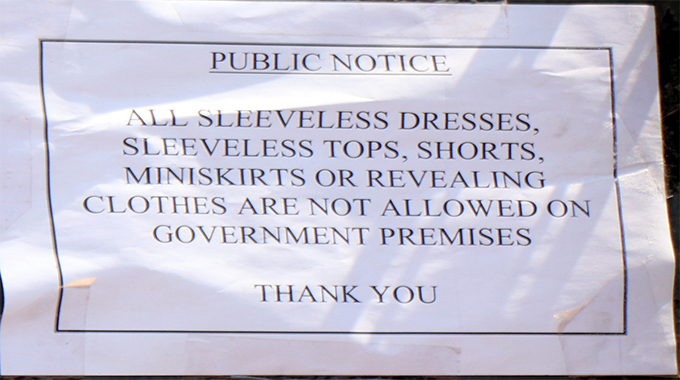The Vehicle Inspectorate Department (VID) has introduced an immediate ban on revealing clothing, such as shorts, sleeveless tops, and miniskirts, at all its depots across the country. This move has ignited a spirited debate among the public, with reactions ranging from support to criticism, as many grapple with the implications of the new dress code policy.
Notices outlining the dress code have been prominently displayed at VID depots nationwide, including in Bulawayo. Signs at the entrance state, “All sleeveless dresses, sleeveless tops, shorts, miniskirts, or revealing clothes are not allowed on Government premises.” Mrs. Eustina Nyathi, the VID National Deputy Director, confirmed the enforcement of this policy, asserting that it is not a new regulation but rather a strict application of existing government guidelines. She likened the dress code to those enforced in courtrooms, where specific attire is mandated to maintain a certain level of decorum.
“The dress code issue is not a new thing. If you go to the courts, there is a certain fashion that one has to wear, and if you are not in sync with that, you will not be allowed in,” Mrs. Nyathi explained. Her comments suggest that the VID aims to uphold a standard of professionalism, arguing that the ban is rooted in maintaining decorum within government facilities.
The decision to enforce the dress code came after a series of complaints from both staff and clients regarding what was deemed inappropriate attire during driving tests. According to Mrs. Nyathi, the concerns highlighted issues of professionalism and comfort during official interactions.
However, the new enforcement has faced backlash, with critics arguing that it disproportionately targets women and could be seen as discriminatory. Sikhululekile Moyo, a Councillor from Bulawayo’s Ward 17, strongly opposed the policy, calling it unfair and asking for clarity on what constitutes appropriate attire. “This is discriminatory, no two ways about it. Why should they target females? They must inform us how exactly they want us to dress because what may be appropriate for me may be viewed as revealing to someone else. This position must be reversed,” she stated.
The controversy has opened up a larger dialogue about the balance between professional standards and individual freedoms in public spaces. While the VID insists that the policy is merely a reinforcement of a long-standing government directive, the implications of such a ban are significant.
An anonymous VID employee in Bulawayo indicated that the change was largely prompted by complaints from male examiners and inspectors. Some male staff members reportedly expressed discomfort, feeling that they were subjected to sexual harassment by clients who wore what they deemed inappropriate clothing. “You won’t believe it, but we once had a learner driver who was scantily dressed, and when a strong wind blew, it lifted her dress, revealing everything,” the official recounted. The anecdote highlights the complexities of the situation, where personal comfort and professional conduct intersect.
Critics also argue that enforcing a dress code may not effectively address the underlying issues of harassment and discomfort in professional settings. Some suggest that instead of imposing restrictions on attire, the focus should be on fostering a respectful and professional environment through education and policy changes that address behavior rather than clothing.
As the public continues to voice their opinions, the VID’s decision underscores a broader cultural discussion about gender, professionalism, and the interpretation of appropriate attire in different contexts. While some support the ban as a necessary measure for maintaining professionalism, others see it as a step backward in the fight for gender equality and personal expression.
The debate surrounding the VID’s dress code policy is far from over, and it raises important questions about how society defines professionalism and the implications of enforcing such definitions in public spaces. As the conversation unfolds, it will be crucial to consider the diverse perspectives involved and work toward solutions that respect both individual freedoms and the need for professionalism in government offices.
In other news – Kamala Harris gears up for 2024 Presidential election
As the 2024 presidential election approaches, Vice President Kamala Harris is ramping up her campaign efforts alongside her running mate, Minnesota Governor Tim Walz. Facing formidable opponents in former President Donald Trump and Senator J.D. Vance, Harris is determined to convey her vision for America, focusing on the aspirations of hardworking citizens.
In a recent interview with MSNBC’s *The 11th Hour*, Harris passionately articulated her goals for the American people. “Well, if you are hardworking, if you have the dreams and the ambitions and the aspirations of what I believe you do, you’re in my plan,” she stated. Read More
